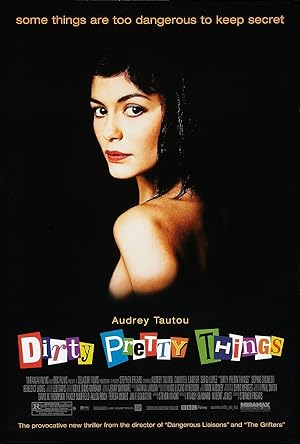Dirty Pretty Things ended up in my queue for two reasons. First, I am a fan of Stephen Frears, director of High Fidelity, The Grifters, Dangerous Liasons and The Queen. Second, I adore Chiwetel Ejiofor from Serenity, Kinky Boots, Inside Man and 12 Years a Slave.
Dirty Pretty Things portrait of morality is the opposite of Biutiful, a movie I also enjoyed. Dirty Pretty Things unfolds in the world of the undocumented immigrants in London. Dirty Pretty Things primarily follows Chiwetel Ejiofor’s character, a Nigerian doctor who now works at a hotel and as a cab driver. It also follows Audrey Tautou, Senay, a Turkish Muslim who works as a housekeeper at the hotel and gives the Nigerian doctor a place to stay. She initially seems hostile to his overtures of friendship, but warms up to him when he shows that he respects her boundaries. He unofficially acts as a doctor for the immigrant community, and that duty collides with his hotel duties when he makes a horrific discovery reminiscent of an iconic bathroom scene in The Conversation. Dirty Pretty Things departs from its sociological slice of undocumented immigrant life for men and women and becomes an interesting twist on the film noir mystery crime drama with a dash of Casablanca. Instead of a gumshoe detective, we have an unlicensed doctor complete with a woman in jeopardy with the sympathetic veneer of socioeconomic criticism of the perils faced by undocumented immigrants.
Dirty Pretty Things was an entertaining film albeit heavy-handed in its moralistic take on exploitation. My main criticism of Dirty Pretty Things is that the end is supposed to be a happy one, but it makes no sense if you think about it. How can he do what he is about to do considering what happened to him in the past? What has changed? How will things be different for Senay?
Stay In The Know
Join my mailing list to get updates about recent reviews, upcoming speaking engagements, and film news.





